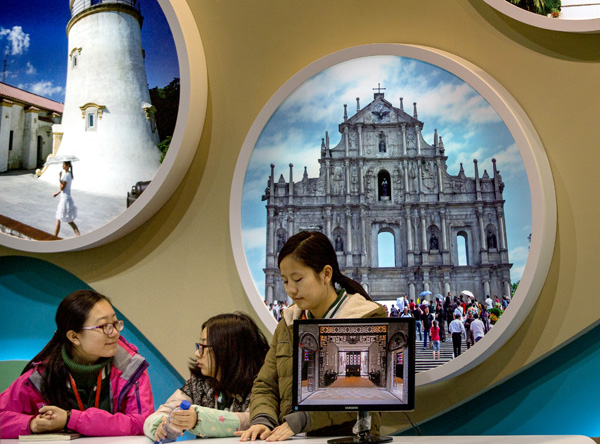Official sees bright future for Macao
By Fan Feifei in Macao (China Daily) Updated: 2014-12-09 07:51
 |
|
Photographs of landmarks in Macao are on display at an exhibition marking the 15th anniversary of the founding of the special administrative region. The exhibition, which opened on Monday at the Beijing Exhibition Center and runs until Dec 28, charts Macao’s economic, livelihood, and social harmony achievements |
The "one country, two systems" plan has been a great success since Macao formally returned to the motherland 15 years ago, according to Li Gang, director of the Liaison Office of the Central People's Government in the Macao Special Administrative Region at a meeting with media ahead of the 15th anniversary.
"Macao has changed dramatically in the past 15 years. Fifteen years ago, I was the director of the Hong Kong, Macao and Taiwan department of the Ministry of Culture and led an arts troupe of about 300 people who gave a performance to celebrate Macao's return to the motherland. At that time, Macao was very different from today," Li said.
For example, the number of casinos in Macao increased from 11 in 1999 to 35 today, Li said, noting that the Lisboa, the best and largest casino at that time, is now the smallest.
Per capita GDP increased from $15,000 in 1999 to $87,000 today, which ranks second in Asia and fourth globally, according to the Macao Statistics and Census Service. The average monthly income of Macao residents has tripled since 1999, from 4,920 patacas to 15,000 patacas ($615 to $1,880) today. The unemployment rate has dropped from 6.3 percent in 1999 to 1.6 percent today.
Li said the gambling industry "contributed about 330 billion patacas last year to Macao's GDP, and the annual tax on the Macao government reached 130 billion patacas".
"There is no doubt that the gambling industry is the main industry in Macao, but having one single industry is not good, so we need to appropriately diversify the economy and develop other industries, including finance, construction, manufacturing, culture, tourism and traditional Chinese medicine - an important task of the SAR's government. The government has invested a lot of money in these aspects, and we look forward more development," Li said.
Li became the deputy director of the Macao liaison office in 2012 and its director in 2014. Previously, he worked at its sister office in Hong Kong as deputy director.
"The principles of 'one country, two systems' and the Macao Basic Law have been fully implemented. The whole society upholds, supports, studies and publicizes the Basic Law, and the Macao people regard the Basic Law as a common code of conduct and the cornerstone of steady development," Li explained.
Because of the Basic Law, the "one country, two systems" concept and "Macao people governing Macao" with a high degree of autonomy have been successful, giving rise to all kinds of social undertakings, Li said.
Macao is now making efforts to transform itself into "one center, one platform", Li said, which refers to being a world center of tourism and leisure, as well as a trade and service platform for China and Portuguese-speaking countries. It also represents the positioning of Macao in the nation's 12th Five-Year Plan (2011-15), Li said. "The country has given Hong Kong and Macao a whole chapter in the plan, providing huge development room for Hong Kong and Macao in the future."
Since 2011 the commercial service industry in Macao has developed rapidly, with an annual growth rate of about 20 percent. The exhibition industry is also important. Every year, about 1,000 exhibitions are held in Macao, bringing about more than 2 billion patacas annually.
However, because of high inflation, the Macao people still want to see improvements in their lives, such as improved healthcare and entrepreneurship, Li said.
In a speech, Chui Sai On, Macao's chief executive, said the SAR needs to establish security for livelihoods, improve health services and solve the housing problem. The incoming government plans to provide 32,000 public houses, Li said.
"Moreover, we should give a larger platform for young people to start a business, and more development opportunities," Li said.
In the future, Macao should strengthen cooperation with the mainland, as well as regionally, and simplify administration, as proposed by Chui, Li said.
- Govt encourages people to work 4.5 days a week
- Action to be taken as HIV cases among students rise
- Debate grows over reproductive rights
- Country's first bishop ordained in 3 years
- China builds Tibetan Buddhism academy in Chengdu
- Authorities require reporting of HIV infections at schools
- Typhoon Soudelor kills 14 in East China
- Police crack down on overseas gambling site
- Debate over death penalty for child traffickers goes on
- Beijing to tighten mail security for war anniversary







